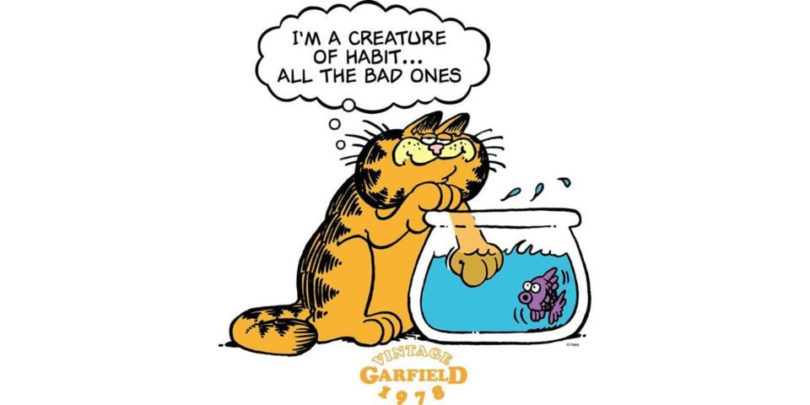Some good advice for bad habits!
Dropping Bad Habits
by Tom Lewis
I finally got my cigarette smoking under control, after decades of a pack a day, when I realized that for me it was not a matter of addiction, but of habit. (I speak here only for myself. I’m not preaching, I’m just remembering something that I experienced.) A few times, by accident, I was deprived of cigarettes for a substantial period of time and nothing bad happened, physically. I kept reaching to the pocket where I kept them, kept snapping open the lighter, but for me, the internal craving was far less than the pull of accustomed things to do with my hands when the coffee was served, or the meal was over, or — you know.
Treating it as a bad habit allowed me to get the upper hand, and quit. Similarly, there have been times in my life when over a period of time I was consuming far too much alcohol. Again, when circumstances showed me I could abstain without any physical consequences, and I decided I was dealing with habit — a ritual, really, performed only before, during and after meals and before bedtime (forevermore extended periods of time before and after and then the time in between as well) — I was able to get it under control without severe consequences in my life. Again, I’m not recommending this to anyone else, just saying it worked for me.
Now it seems something very much like that is happening to our entire society, because of the pandemic — the accident that deprives us of some things we assumed were essential to our lives, and now are looking sort of silly.
Because of the restrictions required by public health, more and more people are discovering more and more things that are not in fact essential to their well being, but are simply bad habits. Among them:
- Professional sports. Spending a day and small fortune to struggle through traffic to assemble in a huge arena to “watch” — often from an altitude of a hundred feet or more — millionaire athletes play with a ball. Like lemmings cut from the herd, more and more people are shaking their heads and saying, “Wait, why were we doing that again?”
- Professional sports on TV. The players are interchangeable, the teams (and their home cities) are interchangeable, even the sports. And the interminable interviews with 20-somethings spewing Yoda-like observations about Sports and Life (“yeah, they really came to play today….”). Why were we doing that again? (Tickets sales and TV ratings for professional sports were sinking fast before the coronavirus arrived.)
- Going out to dinner. Dressing up. Fighting traffic. Finding a place to park. Standing in line. Being seated next to the swinging doors to the kitchen. Wouldn’t it be just as much fun to sit around the dining room table and burn $100 bills?
- Going to bars. Crowding into a bar to drink and mate, listening to music on speakers set to “stun,” shouting lame pickup lines into indifferent faces, performing sweaty dances designed to imitate sex, at the risk of DUIs and STDs, was for many of us, for a long time, the very essence of “fun.” Some of us grew out of it, some of us were stopped dead when the pandemic closed the bars, and many of us now look at that behavior and say, “What?”
- Going to meetings. Crowding into conference rooms to make absolutely sure that no one gets anything done in the office for the next two hours; traveling “business class” to distant cities to spend hours crowded into conference rooms listening to anesthetic PowerPoint presentations (One commander of US forces in Afghanistan fumed that having his staff officers use PowerPoint in briefings was the equivalent of giving the enemy two extra divisions of troops); all essential to the way we do business. Except the virus shut all that down, and no one missed it. Shall we go back to doing it again? Why?
- The Sunday drive to nowhere. The all-you-can-eat-and-drink cruise vacation. The vacation itself — what the hell does it mean, to vacate?
The list goes on, of things that once were as reflexive to us as smoking once was to me, practices that we have been knocked out of by the pandemic and that now stand revealed not as things essential to us, but rather odd, compulsive habits that no one needs.
And if, in substantial numbers, we do not go back to them — why, that will guarantee the almost immediate collapse of what’s left of the economy.







